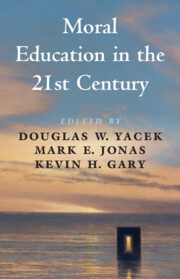Book contents
- Moral Education in the 21st Century
- Moral Education in the 21st Century
- Copyright page
- Contents
- Contributors
- Acknowledgments
- Chapter 1 Why Does Moral Education Matter in the 21st Century?
- Part I Historical Insights for Contemporary Moral Education
- Part II New Approaches to Moral Education
- Part III Responses to Contemporary Moral Problems
- Chapter 13 Moral Education in and for Virtual Spaces
- Chapter 14 The Consumerist Threat to Education and Democracy
- Chapter 15 Moral Education and Deep Disagreement
- Chapter 16 A Character-Based Perspective on Sexual Ethics and Sex Education
- Chapter 17 The Moral Eclipse of Boredom
- Index
- References
Chapter 17 - The Moral Eclipse of Boredom
from Part III - Responses to Contemporary Moral Problems
Published online by Cambridge University Press: 01 June 2023
- Moral Education in the 21st Century
- Moral Education in the 21st Century
- Copyright page
- Contents
- Contributors
- Acknowledgments
- Chapter 1 Why Does Moral Education Matter in the 21st Century?
- Part I Historical Insights for Contemporary Moral Education
- Part II New Approaches to Moral Education
- Part III Responses to Contemporary Moral Problems
- Chapter 13 Moral Education in and for Virtual Spaces
- Chapter 14 The Consumerist Threat to Education and Democracy
- Chapter 15 Moral Education and Deep Disagreement
- Chapter 16 A Character-Based Perspective on Sexual Ethics and Sex Education
- Chapter 17 The Moral Eclipse of Boredom
- Index
- References
Summary
This chapter is concerned with the moral significance of boredom. Boredom is a problematic mood state that is causally correlated with several troublesome behaviors. While omnipresent in schools, boredom is seldom addressed explicitly. Schools do, however, offer a latent curriculum vis-à-vis boredom. Confronted with boredom, students are conditioned to do one of two things: first, escape boring circumstances, as much as possible, or second, resign themselves to boredom as an inevitable part of life. Both responses are problematic and avoid meaningful reflection on and engagement with this troubling mood state. In the chapter, I explore the nature of boredom (both situational and existential). I then turn to Albert Borgmann’s notion of a focal practice as a promising antidote to boredom. In Borgmann’s phenomenology of focal practices, I find resources for a pedagogy that begins to constructively address the perilous mood state of boredom.
- Type
- Chapter
- Information
- Moral Education in the 21st Century , pp. 326 - 351Publisher: Cambridge University PressPrint publication year: 2023



